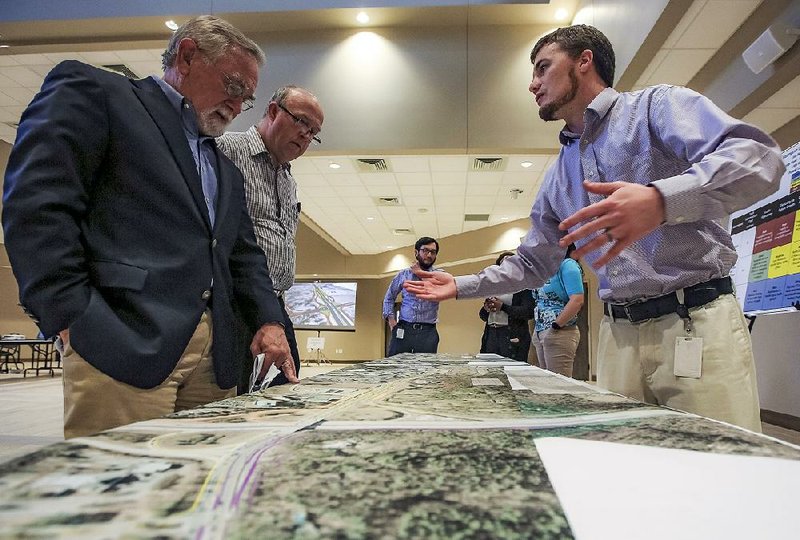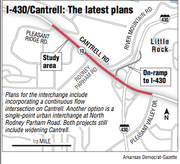Two options proposed for changing the heavily traveled Cantrell Road/Interstate 430 interchange in west Little Rock attracted about three dozen people during the early part of a three-hour public viewing session Thursday.
Plans and maps outlining a continuous-flow option and a single-point urban option were available for the public to study and comment on during the meeting at Christ the King Catholic Church, near Rodney Parham and Cantrell roads.
In 2013, the Arkansas Highway and Transportation Department settled on the continuous-flow option, but this month the single-point urban option was proposed as an alternative.
About 54,000 vehicles a day travel on the section of Cantrell Road, which is also Arkansas 10, west from Pleasant Valley Drive. It's the highest volume of traffic in the state for any arterial, or noninterstate, roadway. In 20 years, projections are that 76,000 vehicles a day will travel along that section, according to a study of the corridor.
The recently proposed single-point urban interchange idea prompted the scheduling of Thursday's public meeting. The new alternative would address the traffic that clogs the Cantrell Road and North Rodney Parham Road intersection, just west of I-430. The design calls for a bridge to carry Cantrell Road traffic over North Rodney Parham Road.
During Thursday's meeting, computer simulations were projected on screens showing the traffic patterns for both options. The single-point option seemed to draw the most viewers, including Bill and Mary Freeman from the Rocky Valley neighborhood.
"It speeds up traffic through here, but you've still got the backup of traffic to Maumelle [on northbound I-430] in the afternoon," Bill Freeman said. "I see it does improve the traffic flow through the [Cantrell/Rodney Parham] intersection."
Mary Freeman said their biggest concern was where traffic would be detoured during construction.
"All of the construction is going to be putting extra traffic on Rodney Parham," she said. "It's full now. I think Rodney Parham will be a heavier traffic area. But, I'm for progress."
Another interested person was Leawood neighborhood resident Jim McKenzie, a retired executive director of Metroplan, central Arkansas' long-range planning agency.
"Of the two alternatives, I think the better, long-term alternative is the single-point urban interchange, the new alternative," McKenzie said. "For one, over the long term, they are projecting 74,000 vehicles through there, and that's just the volume going through the Cantrell/Rodney Parham intersection. The continuous-flow alternative will be hard to handle that volume. It's already hard to handle.
"So I think the single-point urban interchange is the more viable alternative for this," he said. "I'm glad they looked at that as an alternative."
The single-point urban interchange design would be similar to the project completed in 2015 at the Interstate 630/I-430 interchange, nicknamed the Big Rock interchange, which also includes South Shackleford Road and Financial Centre Parkway/Chenal Parkway. That $160 million project added a bridge to take I-630 traffic over Shackleford Road. Before that change, I-630 traffic crossed Shackleford Road instead of going over it.
The continuous-flow design would remove left turns from the main intersection at Rodney Parham and Cantrell Road. Westbound traffic on Cantrell would turn left onto Rodney Parham several hundred feet before reaching the intersection. Traffic would be controlled by a traffic signal and would move into a segregated lane on the south side of Cantrell to another traffic signal at Rodney Parham, where the turn would be executed.
The Highway Department has been studying the continuous-flow design for that interchange since a 2003 study evaluated the use of such a design for five intersections in Arkansas, including Cantrell/Rodney Parham.
The project includes widening Cantrell to eight lanes between Pleasant Valley Drive and Woodland Heights Road. West of Woodland Heights, Cantrell would be widened to six lanes to Taylor Loop Road and to four lanes between Arkansas 300 and Ferndale Cutoff Road.
The Highway Department has allotted $58.3 million in federal and state funds to spend on the project in 2019, according to the agency's 2016-20 statewide transportation improvement program, which lists the projects the department plans to advance.
The listing limits the scope of the project to "major widening" of Cantrell between Pleasant Valley Drive and Taylor Loop Road, a 3.13-mile section.
Metro on 03/31/2017

